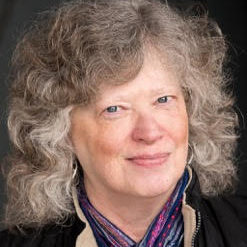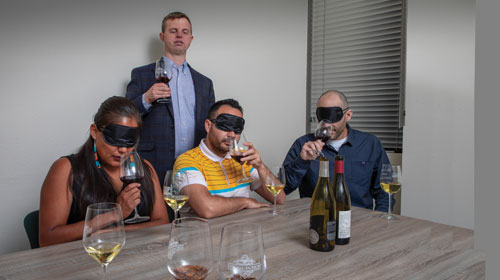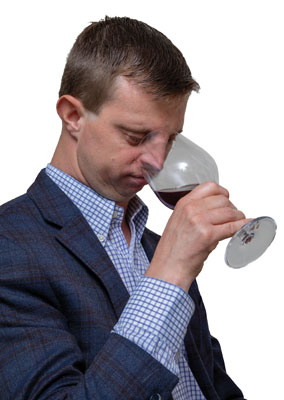 There’s nobody quite like Henry “Hoby” Wedler, Ph.D.—who has accomplished what he has—anywhere else in America. He was born blind, yet he’s a savant deeply versed in the other human senses, particularly smell and taste. He’s parlayed his lack of eyesight into a successful career as a sensory educator and designer, with global clients, spanning many industries, including food and beverage, tech and beyond—some he can identify and talk about, and others he is bound by nondisclosure agreements to keep confidential.
There’s nobody quite like Henry “Hoby” Wedler, Ph.D.—who has accomplished what he has—anywhere else in America. He was born blind, yet he’s a savant deeply versed in the other human senses, particularly smell and taste. He’s parlayed his lack of eyesight into a successful career as a sensory educator and designer, with global clients, spanning many industries, including food and beverage, tech and beyond—some he can identify and talk about, and others he is bound by nondisclosure agreements to keep confidential.
“In the wine industry there are people we refer to as ‘super-tasters’,” says Corey Beck, chief executive officer at Francis Ford Coppola Winery in Geyserville. “Well, Hoby goes beyond that level. His senses are so much better than the average sighted person. He can evaluate a white wine blend and pick out the 5 percent of Sauvignon Blanc, something most everyone else can’t smell or taste.”
Two years ago, Wedler and his business partner and lifelong friend, Justin Vallandingham, co-founded Senspoint Design in a home office in Petaluma. Their mission was to open the doors to sensory literacy, awareness and mindful design. “We are a sensory design company that focuses on providing my insight as a blind person to folks who don’t have that insight, who want to bring in another vision besides eyesight,” says Wedler. “Maybe they want to bring in other ways of thinking. I love working as a translator between scientific and research and development teams, and sales and marketing teams, creating a language they can use.”
What makes Wedler a game changer is his non-visual insight for teaching people to use their other senses to sell and market products. “For instance, there are a lot of people who design packaging without even thinking about the product inside,” he says. “We teach them to get all five of their senses resonating together and to pay close attention to details imparted by all senses.”
Senspoint’s clients have included global food, tech and grocery giants, including French Laundry in Yountville, Farmhouse Inn in Forestville, Safeway as well as Sierra Nevada Brewing Co. in Chico. Wedler and Vallandingham have also conducted some “diversity and inclusion work” for Google. That’s all Wedler is allowed to reveal about that project.
Identifying sensory literacy
While still a student at the University of California at Davis, Wedler got his first big break in what he calls “sensory literacy” work, conducting “Tasting in the Dark” experiences for Francis Ford Coppola Winery visitors beginning in 2011.
“The winery had been looking for a different experience to offer,” says Beck. “Francis had just come back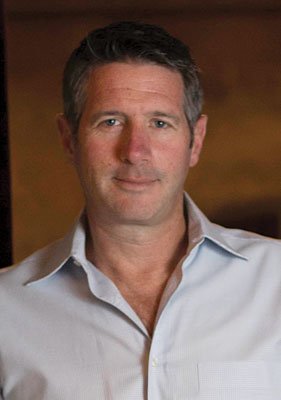 from Japan where he did a blind, seated food tasting at a restaurant. He said it was a wonderful experience, and suggested we start doing blind wine tastings at the winery. We reached out to UC Davis for assistance, and they recommended we speak to a student working on his doctorate. That was Hoby. The match was made, and he was super enthusiastic about taking it on.”
from Japan where he did a blind, seated food tasting at a restaurant. He said it was a wonderful experience, and suggested we start doing blind wine tastings at the winery. We reached out to UC Davis for assistance, and they recommended we speak to a student working on his doctorate. That was Hoby. The match was made, and he was super enthusiastic about taking it on.”
The phone call from Coppola and his winery team rocked Wedler’s world. “They wanted to begin blind tastings led by a blind person and asked if I would partner with them. Then I hung up the phone and wondered what I’d gotten myself into,” he says with a laugh.
The blind tastings at Coppola started as a quarterly gig for Wedler, then became so popular they were scheduled every month and eventually every week. Participants would be led to the tasting already blindfolded. “The tasters didn’t know up front that Hoby was blind,” says Beck. “At the end when all the blindfolds came off, he would reveal it. I loved watching their reactions. Hoby became an amazing spokesperson for the winery.”
“I became known as the blind, blind tasting guy,” Wedler says. Francis wanted an authentic, straightforward experience for visitors, Wedler adds. “We used the blindfolds only as a tool to help focus the tasters on their non-visual senses, to use them more like a lens to get them to think more deeply and profoundly. I deliberately want to stay away from using blindfolds as any sort of gimmick, or game.”
Beck says Wedler fell in love with the alcohol beverage industry from conducting those tasting experiences. “Then he put on his business hat and is now making a living doing something he loves and that he’s really good at. Hoby is definitely the only person I know of who is doing this kind of work.”
Wedler also collaborated with the Coppola winery sales team to conduct blindfolded tastings for its distributors, and key accounts such as Safeway, Cost Plus World Market, Kroger, Walgreens, Landry’s and more. From that came other opportunities to work with beer and spirits companies, and even The French Laundry.
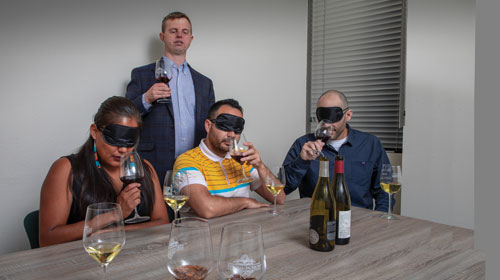
“We showed The French Laundry staff some different ways to talk about wine and how they think about it, and how that broached into the food in their service line,” says Wedler. “I gave them a vocabulary to explain what they do, and to coach them in how to refresh their way of communicating with their customers.”
Since his initial work with Francis Ford Coppola Winery, Wedler’s work has branched out in the Napa and Sonoma wine industry and allowed him to work with such wineries as Pride Mountain Vineyards on top of Spring Mountain, Dutton Estate Winery in Sebastopol, Notre Vue in Windsor. He’s also collaborated on numerous occasions with the Culinary Institute of America, hosting insightful seminars at various conferences all about sensory design.
Inquisitive from the start
Wedler, 32, is a Petaluma native who came into the world with a rare abnormality called microphthalmia, which necessitated prosthetics to replace his eyes. The nickname Hoby comes from the Hobart welder, equipment his father Reed Wedler used when he worked as a welder for PG&E. “My husband liked the name Hobart and the juxtaposition of welder and Wedler, and it was shortened to Hoby,” explains Terry Wedler, Hoby’s mother. Then they gave him an official first name, Henry.
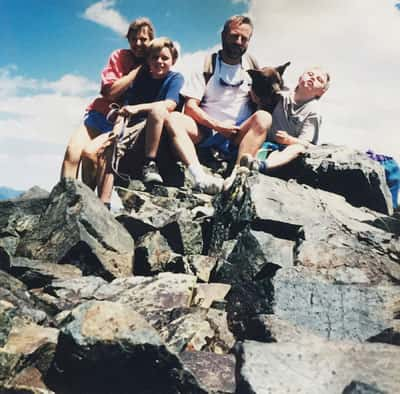 From the time he was tiny, Wedler’s parents described to him everything they were doing, so he would recognize sounds. “In the kitchen I’d tell him that I was running the water in the sink, or opening or closing the refrigerator door,” says Terry. “We worked hard at helping Hoby understand his environment, and to make certain he hit all his normal development milestones. We were very lucky he had no other disabilities.”
From the time he was tiny, Wedler’s parents described to him everything they were doing, so he would recognize sounds. “In the kitchen I’d tell him that I was running the water in the sink, or opening or closing the refrigerator door,” says Terry. “We worked hard at helping Hoby understand his environment, and to make certain he hit all his normal development milestones. We were very lucky he had no other disabilities.”
The Wedlers recognized early in Hoby’s life that he was acutely interested in everything going on around him and had excellent language skills. “He had a vocabulary of 132 words at the age of 18 months, and by the age of 2 he was speaking complete sentences,” says his mother. “So he was already ‘mentally mapping,’ as he puts it. Hoby still talks to this day about mentally mapping to get where he’s going. He’s always had good spatial awareness.”
Wedler attended and graduated from Petaluma public schools. “We felt that he received an excellent education at Cherry Valley, Petaluma Junior High and Petaluma High School. By 7th grade, at Petaluma Junior High School, he really stood out,” says Terry. “Until then he’d been struggling to learn Braille and to use a cane, but that first year in junior high he had a science class and was excited about the teacher, and it turned out he was good at science and math.”
“I did well in school,” adds Wedler, a self-proclaimed nerd with his own Wikipedia profile page. “I got good grades and took great pride in it. I was always encouraged to excel. Gifted? I don’t know about that. I was identified as unique, but not necessarily gifted. Being blind, I’ve learned how to work hard, and working hard often leads to success.”
While still a student, Wedler founded a nonprofit called Accessible Science, to conduct chemistry camps for blind and visually-impaired high school and early college students. “Being blind shouldn’t hold a person back from any line of work they want to pursue, except for driving a truck,” he says with a laugh. “The camp included lectures by grad students and professors from UC Davis to show the students how science careers can be a good fit for them. Our focus was on chemistry, but it was applicable to any science, to teach them how to open their minds to their own capabilities.” (After conducting eight chemistry camps that hosted students from California, other states and Mexico, the Accessible Science program is currently on hiatus as Wedler builds his other companies.)
Terry Wedler attributes her son’s success in part to keeping up with his sighted brother, Jesse, a business school grad who’s worked for Goldman Sachs and Google, among others. “He’s two years older than Hoby, and Jesse was his role model,” she says. “They talk frequently about business, and Jesse tells Hoby all the time to focus.”
The X factor
Blindness is a nuisance, says Hoby Wedler, but not a lifelong problem. “My parents are wonderful. They had extemely high expectations for us and treated us with utmost respect. This led us to believe in ourselves. They taught us that there is no substitute for hard work, if you want to be good at what you do and be respected. As a blind guy living in a sighted world, I had to find a niche or do my work slightly better than my sighted peers.
“Not having eyesight was an inefficiency in some ways, but my parents gave me the opportunity to thrive and not let blindness hold me back. It’s the X-factor of Senspoint, turning a disadvantage into an advantage.”
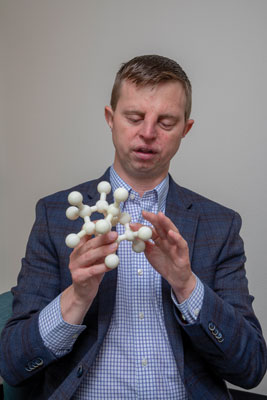 In May, Wedler and Vallandingham were in serious merger talks with others, including a strategic firm in Australia that will take Senspoint to the next level, offering full-spectrum design services with a unique sensory approach to drum up new business and work with more mainstream companies. The merged company will hold the same name as Senspoint Design. Wedler says this new venture will provide more diversification and help his small company take advantage of larger business opportunities. The deal has just been completed and will be announced in early August. The merger is an equal partnership of five members, including Wedler, Vallandingham, Jody Tucker of Tucker Creative in Australia, video producer Ilene Liff-Mier, and brand strategist Wakana Omija.
In May, Wedler and Vallandingham were in serious merger talks with others, including a strategic firm in Australia that will take Senspoint to the next level, offering full-spectrum design services with a unique sensory approach to drum up new business and work with more mainstream companies. The merged company will hold the same name as Senspoint Design. Wedler says this new venture will provide more diversification and help his small company take advantage of larger business opportunities. The deal has just been completed and will be announced in early August. The merger is an equal partnership of five members, including Wedler, Vallandingham, Jody Tucker of Tucker Creative in Australia, video producer Ilene Liff-Mier, and brand strategist Wakana Omija.
Wedler plans to continue using blind tastings of all types for Senspoint as a tool to foster creativity and imagaination. “I plan to continue private tastings for consumer groups and perhaps some business-to-business opportunities.” He has also partnered with a test kitchen and design studio called Feast It Forward in Napa, where he conducts blind tastings by appointment.
“One of the main things I personally love to do is public speaking, to help open people’s minds, using my work and experiences to get them to think more uniquely and creatively. I like providing people with the ability to see what they offer that drives them to be more successful.” Wedler presented a TEDx talk in November 2017 on the TedX Sonoma County stage that’s available for viewing on YouTube.
Another of Wedler’s ventures moving forward quickly is a Petaluma-based vodka and gin company that he plans to launch by the end of this year. He hopes to market and sell the spirits first within California and Illinois and then distribute nationally. “I can’t announce a company name because it’s not yet trademarked,” he says. “Down the road I want to eventually expand beyond vodka and gin and license that brand seal to other companies, as a symbol of quality and authenticity. That’s the goal.”
Wedler’s mother says Hoby sticks his neck out and is not afraid to take risks. “He also confidently thinks of people as partners even before they are. Just like the Australia merger and partnership. He and Justin spent several days in Australia after researching many other teams to help develop their business. Some startups are not successful, but this one feels like everything is in place just right.”
“I love building relationships with the people I meet,” says Wedler. “It’s all about forming relationships and forming opportunities for people to bring their best selves forward.”
Positive thinking
One of the pillars of Senspoint, he says, is to make the world more inclusive and accessible to everyone. “By accessible I mean in everything we do, we think about accessibility. We want to design our work so we execute it in such a way that it makes the world a more accessible place. It’s near and dear to me, to create a diverse and sustainable community.
“I’m a scientist by training, but I’ve constantly strived to straddle the fine intersection between science and art. Simply put, science fills our toolbox, but art is how we decide to use those tools to build something.”
The most important thing in business, Wedler says, is to be a positive thinker. “Naysayers are held back by tension. We all have tension in our lives, especially those who start businesses, or have deadlines to meet. It’s like the electrical wiring in a house. It can get hotter and hotter and burn out, or you can figure out how to resolve the tension and move forward.”
A positive attitude in business can lead to extraordinarily successful ventures, he adds. “When I began studying for my doctorate, I didn’t know how I was going to make it happen, but I did it. I feed off challenges that at first might seem undoable. I had to fight off negative thoughts about starting these new business opportunities as well, but by shifting attitude a person can move ahead by leaps and bounds. The more we can be positive and be good listeners and active thinkers, the better people we are and the easier time we will have conducting business.”
Coppola Winery’s Beck fondly remembers a short exchange he had with Wedler a few years back. “Hoby asked me if I’d watched the 49ers game over the weekend, and I said, yes, and it was great. He said he watched it from beginning to end. Not that he listened to it, but watched it. He’s been an inspiration with his can-do attitude and all that he’s accomplished.
“Being associated with Hoby made us a better company. He’s an honest, genuine person with integrity and character. And at the end of the day you want to surround yourself with passionate people with integrity, people you would go into battle for. That’s Hoby.”
What is Sensory Literacy?
Hoby Wedler, Ph.D., believes everyone should take in data from all five of their senses, process that data, and then intelligently draw conclusions and predictions. Many industries and marketers have been slow to tap into appealing to all five of the human senses when promoting and advertising their brands. Here are some facts from Wedler on senses and their impact on consumers.
• 99 percent of all brand communication currently focuses on only two of the senses—sight and sound.
• The more senses appealed to, the more effective the branding will be.
• When the smell of a just-baked apple pie spreads in an appliance store, sales rise by 33 percent.
• Humans can distinguish more than 10,000 smells.
• High-frequency sounds enhance sweetness in food, while low sounds bring out bitterness.
Wedler’s Curriculum Vitae
Henry “Hoby” Wedler, Ph.D., is a Petaluma native who attended Petualuma city schools before entering college at UC Davis. There, he earned a BA in history (with a minor in mathematics), a BS in chemistry, and in 2016 received his doctorate in computational organic chemistry. Wedler founded the nonprofit organization Accessible Science while still a student, conducting chemistry camps for blind and visually-impaired high school and early college students, to focus on using their sense of smell to determine the progression of chemical reactions. The gatherings were held at the Enchanted Hills camp in Napa County, near the top of Mount Veeder. After completing his Ph.D., Wedler co-founded Senspoint Design, a consultancy for sensory experiences. His unique sensory design work has earned him numerous prestigious awards and high-profile recognition over the years.
In 2011: Wedler was presented with a National Achievement Award from Learning Ally, an organization that produces and maintains a library of accessible educational audiobooks for people who cannot read standard print because of visual impairment, dyslexia or other disabilities.
In 2012: He was hosted at the White House to accept a Champions of Change award, an honor bestowed during the Obama administration. The award was given to 14 individuals all committed to enhancing education and employment opportunities for people with disabilities in science, technology, engineering and math fields—also known as STEM.
In 2016: Wedler was named to the “30 Under 30” list in Forbes magazine in the Food and Drink category. That same year, he distinguished himself by being named to the “40 Under 40” list in the Sacramento Business Journal.
In 2017: Wedler received the Diversity and Inclusion Prize from the Royal Society of Chemistry, jointly awarded to Dean Tantillo, one of Wedler’s mentors and a professor at UC Davis. Wedler is currently on the board of directors at the Petaluma Educational Foundation, as well as an active volunteer with the Earl Baum Center of the Blind.
Dr. Wedler’s TEDx Talk
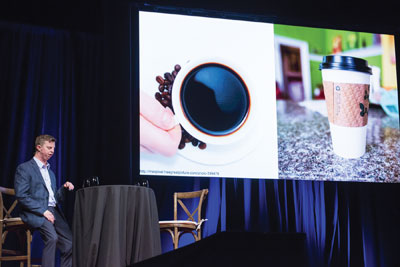
In late 2017, Hoby Wedler, Ph.D., addressed the audience at TEDx in Sonoma County to discuss sensory literacy. Here are excerpts from his presentation:
“Imagine being in a field, standing there on a foggy spring morning in southern Sonoma County. The visual is striking and commands your full attention, but what other information do your other four senses offer you? Birds chirping, cows mooing, the viscosity in the air, the smells of bay, eucalyptus and redwood trees, manure, the fresh cut grass. It’s an aromatic symphony. The ground is soft and yielding from the winter rains.
“I’m completely blind and I was born this way. I stood in this field with sighted friends who couldn’t stop talking about the view, trying to explain the vista to me, to describe the color green. When back in the car, I decided to tell them what I noticed of the surroundings. They were so focused on the visual they were incapable of looking beyond eyesight. It’s a valuable sense, indeed, that tells us a great deal about the world around us, but it can be distracting and cause our other senses, if we’re not careful, to go dormant.
“We use vision for 85 to 90 percent of the information we acquire about our surroundings, which means we have four other perfectly good senses to obtain another 10 to 15 percent [of information].
“Listen to the sounds of automobile doors shutting. Which is the entry-level vehicle and which is the luxury model? Clearly the luxury carmaker has put more attention into making their door shut quietly. So the next time you pick out a car, I bet a multitude of sensory data will play into your buying decision.
“Next time you drive to the coast or anywhere, roll down the windows and smell the air, feel the wind in your hair and be sensitive and absorbent to everything going on around you. Trust your eyesight, but not so much that it makes your other senses lazy.”
Wedler’s complete TEDx talk can be viewed on YouTube.


